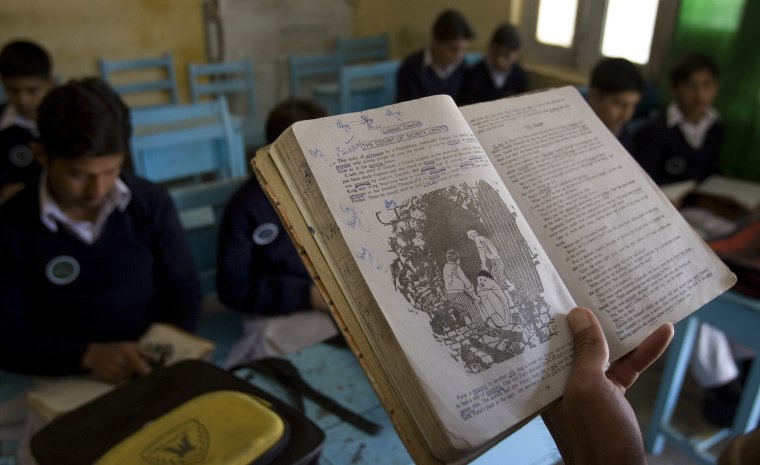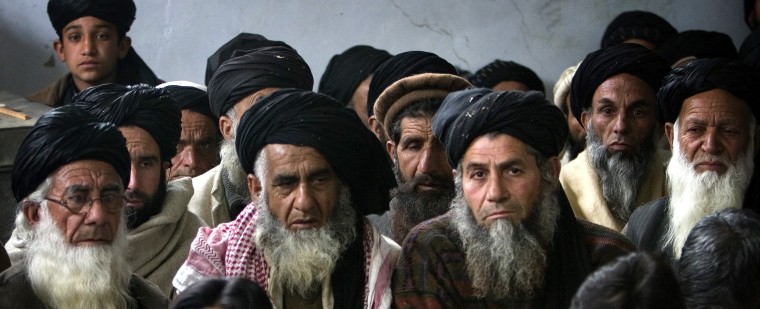Zeb Gul used to sell music CDs in this mountain town but was driven out of business by Taliban militants engaged in peace talks with Pakistani leaders desperate to halt their march across the nation.
The government insists the Taliban won't be allowed to enforce its harsh version of Islam here, but merchants like Gul know otherwise — he switched to selling poultry.
"The Taliban now call the shots. We cannot do anything that offends them," he said, standing outside his shop in this once-popular tourist destination less than two hours drive from the Pakistani capital.
Pakistan's leaders contend their peace talks with the Taliban in this region of snowcapped mountains and fertile valleys involve implementing a mild version of Islamic law, in which girls would still be allowed to attend school, vendors like Gul could continue to sell music and movies, and there would be no public floggings or executions.
But three weeks since a cease-fire took hold, the Taliban appear to have used the pause in fighting to tighten their hold over the Swat Valley, especially in and around the main town of Mingora.
There is also skepticism the militants — who do not have to surrender any arms under the cease-fire — will modify their hard-line brand of Islam, as well as concern the region will simply become a safe haven for the Taliban.
In his tiny shop in Mingora's main bazaar, Ali Ahmed now hawks cell phones — not the Pakistani pop music he used to sell, deemed sinful by the Taliban. He says only that the "situation" means his music business was no longer viable.
Headed for collapse?
With its lush mountain scenery and the country's sole ski resort, the Swat Valley once attracted wealthy Pakistani vacationers and adventurous Westerners. It lies just east of Pakistan's tribal belt along the border with Afghanistan, where al-Qaida and the Taliban have long held sway.
But over the past 18 months, Taliban militants have battled security forces in Swat, beheading political opponents and burning scores of girls' schools. Hundreds have been killed in the fighting, which has sent a third of its 1.5 million people fleeing.
The prospect of ceding a further chunk of the region to extremists has alarmed Washington and many Pakistanis, who note the people of Swat rejected Islamic hard-line parties in 2008 elections and voted in a secular party which is now negotiating with the militants.

Many analysts believe any final peace deal in Swat, like a previous agreement with the militants that failed last year, will eventually collapse leaving the Taliban in a stronger position, having been given time to consolidate.
Despite the current cease-fire, violence has continued. Taliban militants killed two Pakistani soldiers this week who they accused of patrolling without first informing them, one of the terms of the truce. The day after the cease-fire was formalized, a TV journalist from Pakistan's most popular news channel was abducted and murdered in an area known to be under militant control.
The government has been talking to the Taliban through Sufi Muhammad, an aging pro-Taliban cleric who has publicly renounced violence, but who leads a movement with identical political aims. He was imprisoned for years for sending thousands of fighters to Afghanistan to fight U.S. troops after the invasion in 2001.
Government officials have defended the negotiations with Muhammad as an attempt to isolate armed Taliban militants from nonviolent movements in the valley, even if the latter have extremist views.
"In America, they have thousands of laws they use, they have their own system," said Amir Izzat, a spokesman for Muhammad. "Here we are Muslims. We are the supporters of the Islamic system and this is our right and we will use our right to live according to the Quran and the Hadiths," he said, referring to Islam's holy texts.
Secret negotiations
In Mingora, an Associated Press photographer saw scores of Muhammad's followers in the street last week, some in cars playing music glorifying jihad, or holy war. The police presence was limited to the occasional officer directing traffic.
The nearby districts of Kanju and Matta were under total Taliban control and outsiders were not allowed to visit, residents said.
The overall peace talks have been shrouded in secrecy: Neither the process for formalizing any deal nor who would enforce it has been clearly explained. A spokesman for President Asif Ali Zardari says the Pakistani leader will not sign any changes in the law affecting Swat until peace and the authority of the government have been restored there.
"You know it has been bloodshed for the last two years. It has been a complete chaos and vacuum. So, what we are trying at present is a transition from instability to stability," said Khushal Khan, the top civilian administrator in the valley.
He suggested the militants would give up their weapons voluntarily after some time.
On Wednesday, the government in Swat said it had agreed to 17 points that appeared to significantly widen the scope of the Islamic law it promised to implement. Among them, stores must now close during prayer time, shops selling CDs and "obscene videos" must close, and prostitutes would be driven from the valley.
But other officials have insisted that while Islamic judges would be brought into the justice system, they would not be allowed to change the political system or start regulating social issues.
"Nobody will be allowed to close shops selling CDs," provincial law minister Arshad Abdullah said.
Residents, many of whom fled during the fighting, are simply glad of the respite from army shelling and brutal Taliban executions designed to dissuade anyone from resisting their authority.
"We are happy that peace is coming to our region," said Zia ud-Din, a 45-year-old lawyer. "We no longer see bodies hanging from trees."
